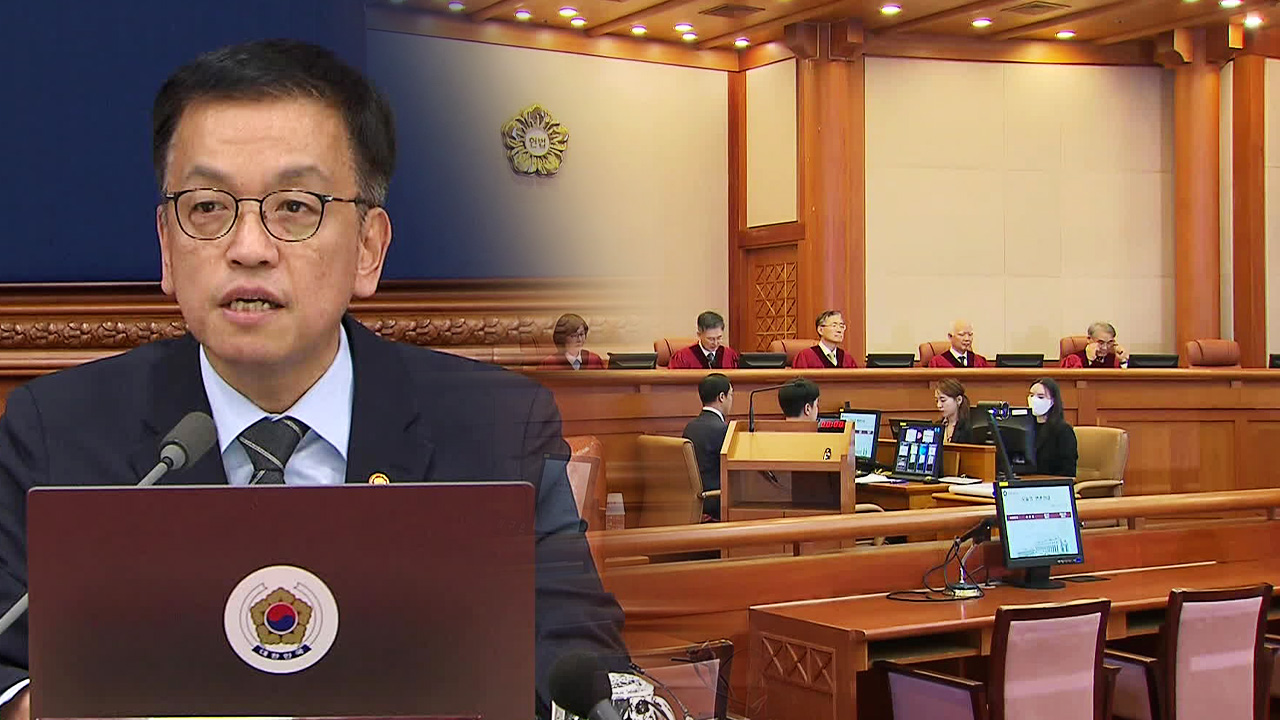Army supports infertility treatment
입력 2025.02.02 (23:40)
읽어주기 기능은 크롬기반의
브라우저에서만 사용하실 수 있습니다.
[Anchor]
There is a place that is implementing a work location adjustment system to solve the low birth rate issue.
That place is the Army.
Couples experiencing infertility can choose once during their service period to serve in their desired area, limited to one year.
Reporter Kim Bo-dam spoke with those utilizing this system.
[Report]
Mr. Park, an Army officer, has been undergoing infertility treatment for three years.
Leaving home for the hospital in the early dawn before the sun rises has now become a regular routine.
[Mrs. Lee/Infertility treatment couple/Wife: "There have been more days when I went earlier than today. When I get there, I'm not number one on the waiting list. Even when I go earlier than this time."]
Infertility treatment is full of variables.
Appointment dates can suddenly change, often requiring urgent leave.
Fortunately, Mr. Park is currently serving in the metropolitan area, where there are many infertility treatment hospitals, allowing him to continue his treatment.
[Mr. Park/Infertility treatment couple/Husband: "I have to visit the hospital throughout the month. In such cases, if I lived in a rural area, it would be very difficult to come for treatment..."]
However, if serving outside the metropolitan area, the situation becomes much more challenging.
Nearly half of infertility treatment hospitals are concentrated in the metropolitan area, significantly reducing accessibility in other regions.
As a result, the Army allows infertile couples to serve once during their service period in their desired area, limited to one year.
Mr. Park has been serving in the metropolitan area using this system, but the application period ends this March.
[Mr. Park/Infertility treatment couple/Husband: "Having to go to a rural area next rotation is somewhat of an unwritten rule..."]
He has suggested revising the regulations, but it has not been accepted.
[Mr. Park/Infertility treatment couple/Husband: "The Navy and Air Force say they don't even have such regulations, and they suggest that we should be satisfied with the Army having a regulation for one job adjustment."]
An Army official responded, "There are difficulties in extending service in the desired area from the perspective of personnel management and fairness in personnel affairs."
This is KBS News, Kim Bo-dam.
There is a place that is implementing a work location adjustment system to solve the low birth rate issue.
That place is the Army.
Couples experiencing infertility can choose once during their service period to serve in their desired area, limited to one year.
Reporter Kim Bo-dam spoke with those utilizing this system.
[Report]
Mr. Park, an Army officer, has been undergoing infertility treatment for three years.
Leaving home for the hospital in the early dawn before the sun rises has now become a regular routine.
[Mrs. Lee/Infertility treatment couple/Wife: "There have been more days when I went earlier than today. When I get there, I'm not number one on the waiting list. Even when I go earlier than this time."]
Infertility treatment is full of variables.
Appointment dates can suddenly change, often requiring urgent leave.
Fortunately, Mr. Park is currently serving in the metropolitan area, where there are many infertility treatment hospitals, allowing him to continue his treatment.
[Mr. Park/Infertility treatment couple/Husband: "I have to visit the hospital throughout the month. In such cases, if I lived in a rural area, it would be very difficult to come for treatment..."]
However, if serving outside the metropolitan area, the situation becomes much more challenging.
Nearly half of infertility treatment hospitals are concentrated in the metropolitan area, significantly reducing accessibility in other regions.
As a result, the Army allows infertile couples to serve once during their service period in their desired area, limited to one year.
Mr. Park has been serving in the metropolitan area using this system, but the application period ends this March.
[Mr. Park/Infertility treatment couple/Husband: "Having to go to a rural area next rotation is somewhat of an unwritten rule..."]
He has suggested revising the regulations, but it has not been accepted.
[Mr. Park/Infertility treatment couple/Husband: "The Navy and Air Force say they don't even have such regulations, and they suggest that we should be satisfied with the Army having a regulation for one job adjustment."]
An Army official responded, "There are difficulties in extending service in the desired area from the perspective of personnel management and fairness in personnel affairs."
This is KBS News, Kim Bo-dam.
■ 제보하기
▷ 카카오톡 : 'KBS제보' 검색, 채널 추가
▷ 전화 : 02-781-1234, 4444
▷ 이메일 : kbs1234@kbs.co.kr
▷ 유튜브, 네이버, 카카오에서도 KBS뉴스를 구독해주세요!
- Army supports infertility treatment
-
- 입력 2025-02-02 23:40:50

[Anchor]
There is a place that is implementing a work location adjustment system to solve the low birth rate issue.
That place is the Army.
Couples experiencing infertility can choose once during their service period to serve in their desired area, limited to one year.
Reporter Kim Bo-dam spoke with those utilizing this system.
[Report]
Mr. Park, an Army officer, has been undergoing infertility treatment for three years.
Leaving home for the hospital in the early dawn before the sun rises has now become a regular routine.
[Mrs. Lee/Infertility treatment couple/Wife: "There have been more days when I went earlier than today. When I get there, I'm not number one on the waiting list. Even when I go earlier than this time."]
Infertility treatment is full of variables.
Appointment dates can suddenly change, often requiring urgent leave.
Fortunately, Mr. Park is currently serving in the metropolitan area, where there are many infertility treatment hospitals, allowing him to continue his treatment.
[Mr. Park/Infertility treatment couple/Husband: "I have to visit the hospital throughout the month. In such cases, if I lived in a rural area, it would be very difficult to come for treatment..."]
However, if serving outside the metropolitan area, the situation becomes much more challenging.
Nearly half of infertility treatment hospitals are concentrated in the metropolitan area, significantly reducing accessibility in other regions.
As a result, the Army allows infertile couples to serve once during their service period in their desired area, limited to one year.
Mr. Park has been serving in the metropolitan area using this system, but the application period ends this March.
[Mr. Park/Infertility treatment couple/Husband: "Having to go to a rural area next rotation is somewhat of an unwritten rule..."]
He has suggested revising the regulations, but it has not been accepted.
[Mr. Park/Infertility treatment couple/Husband: "The Navy and Air Force say they don't even have such regulations, and they suggest that we should be satisfied with the Army having a regulation for one job adjustment."]
An Army official responded, "There are difficulties in extending service in the desired area from the perspective of personnel management and fairness in personnel affairs."
This is KBS News, Kim Bo-dam.
There is a place that is implementing a work location adjustment system to solve the low birth rate issue.
That place is the Army.
Couples experiencing infertility can choose once during their service period to serve in their desired area, limited to one year.
Reporter Kim Bo-dam spoke with those utilizing this system.
[Report]
Mr. Park, an Army officer, has been undergoing infertility treatment for three years.
Leaving home for the hospital in the early dawn before the sun rises has now become a regular routine.
[Mrs. Lee/Infertility treatment couple/Wife: "There have been more days when I went earlier than today. When I get there, I'm not number one on the waiting list. Even when I go earlier than this time."]
Infertility treatment is full of variables.
Appointment dates can suddenly change, often requiring urgent leave.
Fortunately, Mr. Park is currently serving in the metropolitan area, where there are many infertility treatment hospitals, allowing him to continue his treatment.
[Mr. Park/Infertility treatment couple/Husband: "I have to visit the hospital throughout the month. In such cases, if I lived in a rural area, it would be very difficult to come for treatment..."]
However, if serving outside the metropolitan area, the situation becomes much more challenging.
Nearly half of infertility treatment hospitals are concentrated in the metropolitan area, significantly reducing accessibility in other regions.
As a result, the Army allows infertile couples to serve once during their service period in their desired area, limited to one year.
Mr. Park has been serving in the metropolitan area using this system, but the application period ends this March.
[Mr. Park/Infertility treatment couple/Husband: "Having to go to a rural area next rotation is somewhat of an unwritten rule..."]
He has suggested revising the regulations, but it has not been accepted.
[Mr. Park/Infertility treatment couple/Husband: "The Navy and Air Force say they don't even have such regulations, and they suggest that we should be satisfied with the Army having a regulation for one job adjustment."]
An Army official responded, "There are difficulties in extending service in the desired area from the perspective of personnel management and fairness in personnel affairs."
This is KBS News, Kim Bo-dam.
-
-

김보담 기자 bodam@kbs.co.kr
김보담 기자의 기사 모음
-
이 기사가 좋으셨다면
-
좋아요
0
-
응원해요
0
-
후속 원해요
0















이 기사에 대한 의견을 남겨주세요.